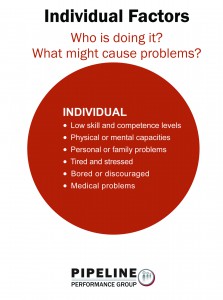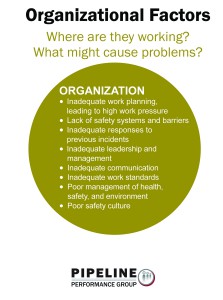April 2009 Vol. 236 No. 4
Features
Human Factors and Safety Are Focus Of Proposed PHMSA Rule
“Why don’t you pipeline companies address controller fatigue?” That question was asked by a member of the National Transportation Safety Board (NTSB) in 2000 while discussing a pipeline accident with one of the authors. The authors can attest that reducing accidents caused by human fatigue is a task on the “NTSB Most Wanted List.”
Wording in the PIPES Act of 2006 indicates to the authors that regulations shall be issued that require operators of gas and hazardous liquid pipelines to evaluate and take measures to reduce risks associated with human factors, including fatigue, for pipeline controllers and other employees. Indeed, a proposed rule, “Pipeline Safety: Control Room Management/Human Factors” was issued by the U.S. Department of Transportation’s Pipeline And Hazardous Materials Safety Administration (PHMSA) in Sept., 2008.
Proposed Rule
What is a human factor? What measures can be taken to reduce the risks of human factors? What mandates does the proposed rule include that address human factors? The industry has addressed some of the issues through operator qualification, but the proposed rule outlines others.
The term human factors applies the knowledge of human capabilities and limitations to the design, operation, and maintenance of a system. When human factors engineering is integrated into all aspects of a pipeline system, the risks of accidents from human error can be reduced. The public, the employees, and the environment are safer. The company has a more efficient and effective operation.
Human factors examines the interaction between people and all of the factors around them – the environment, the procedures, equipment and other people. The discipline of human factors looks at the people, the job, the organization, the environment, and the resources. The goal is to improve the interactions.
The “tight coupling” of a pipeline system makes it vulnerable to an unexpected event or series of events. This is one of the reasons the proposed rule includes sections on SCADA displays, communications, management of changes, alarm management, shift exchange, learning from experiences, qualifications, roles and responsibilities, validation, as well as fatigue mitigation.
An accident usually has multiple causes, and a failure in one area can lead to a failure in another area. Organizations, jobs and individuals may function independently, but all the functions are connected and interdependent. The key aspects of human factors are related to the individual, the organization and the specific job (Figure 1, above).
Humans have certain capabilities and limitations for physical functions such as vision and hearing, but also for social, emotional, and cognitive performance (Figure 2). Each person in a company has physical, mental, intellectual and psychological strengths and weaknesses. Issues in personal lives and health also affect performance. Some of these factors are straightforward and easily measured, while others are difficult to measure or unpredictable. The proposed rule contains requirements for addressing the capabilities and limitations. For example, fatigue is an issue that affects all humans. That fact needs to be addressed through an evaluation of the shift work policies and practices, ongoing education, the responsibilities of the employee and the company, and communication during shift exchange, and in other ways. Ensuring that human capabilities and limits are not exceeded promotes a safe level of operations.

Figure 2: Individual Factors
A company’s leadership, organizational structure and culture are factors that can either prevent or cause problems. The proposed rule requires a company to address changes, evaluate and learn from operations, and validate that human factors are well managed. A learning organization has a process for reviewing all safety incidents and near misses (Figure 3). It develops solutions rather than casting blame. A strong leadership emphasizes the importance of public safety and maintains constant involvement in operations. The organization manages changes that affect operations, ensuring that every affected person has the necessary information about the changes. Regular and accurate communications between management and personnel ensures that information flows effectively. Employees become more engaged and feel that they make a positive contribution.

Figure 3: Organizational Factors
Well-designed jobs support the capabilities and limitations of the different people that fill those positions (Figure 4). It is not possible to “plug and play” a person like a computer module. Supporting personnel means providing equipment that does not tax the physical capabilities of the human operator. User interfaces are designed to clearly and consistently present information in a manner that allows for fast and accurate information retrieval under normal and emergency conditions. Working conditions should be pleasant, clean, and free from distractions, excess noise and over-stimulation.
[inline:fig4.JPG= Job Factors]
Figure 4: Job Factors
The proposed rule seeks to ensure that the responsibilities of the job are well-defined, that people have the necessary instructions and training, and that the SCADA displays and alarms are useful tools instead of hindrances to safe performance.
Industry Participation
PHMSA and the pipeline industry are working together on the proposed rule. API issued a recommended practice about control room management about the same time as the proposed rule was issued by PHMSA. Comments on the proposed rule have been received and are being addressed. The final rule will be different, but the pipeline companies will still be required to address human factors, particularly human fatigue and the other areas in the proposed rule.
About the Authors
Charles Alday is a principal of Pipeline Performance Group. He has experience in pipeline construction, operations, maintenance and management. For the last six years of his 30 year career, he worked with people in all parts of the organization with Colonial Pipeline Company’s Operational Excellence program. The program is designed to eliminate pipeline leaks, spills, and errors. He consults with pipeline and other companies on human performance improvement and organization development. Contact him at 770-422-6834 or by email
charles@pipelineperformancegroup.com.
Michele Terranova is a principal of Pipeline Performance Group. She holds a Ph.D. degree in industrial/organizational psychology with a major in human factors from Old Dominion University. She has worked in environments ranging from the operating theater of a brain surgeon to the deck of an aircraft carrier. She has served as the director of human factors research at Concord Associates, Inc. and as a senior research scientist at The Oak Ridge National Laboratory. Contact her at 770-514-0690 or by email michele@pipelineperformancegroup.com.





Comments